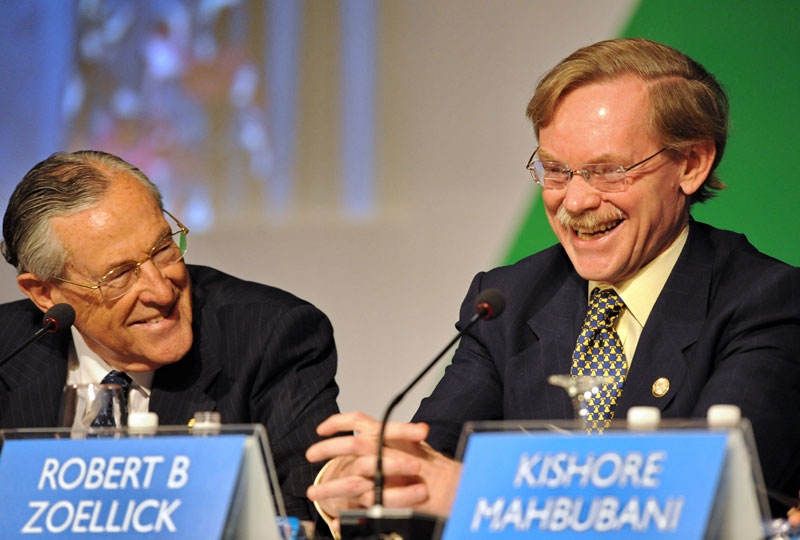A Tribute to Richard Woolcott

By Robert Zoellick
The following remarks were made by Robert B. Zoellick, President of the World Bank Group, on presenting the Australian-American Leadership Dialogue honour to Asia Society's Founding Director of the AustralAsia Center, Richard Woolcott, in Washington on July 14, 2010.
We all owe a special thanks to Phil Scanlan, who has brought extraordinary skills to his creation and encouragement of these meetings.
Now, one of the things I observed about Phil in attending these events is that "Australian" comes first when it's in Australia, and "American" comes first when it is held here. It therefore gives me great personal pleasure in presenting the first award of the A A Leadership honor to Dick Woolcott.
Dick Woolcott is one of Australia's great diplomats and public figures. He's been an adviser to every Australian prime minister since Bob Menzies. But lest you think that all of Dick's service was in striped pants or in fancy drawing rooms, I'd ask you to recall that "Australia" and "diplomacy" are not two words that easily slip off the tongue!
Of course, that's not really fair. But I was certain that God had a sense of humor when it struck me that he had placed the direct, hard-hitting, no-nonsense Australians in the midst of the Asia-Pacific—not exactly the models of the "ASEAN way."
Indeed, my first ever experience with Dick Woolcott over 20 years ago was emblematic. I had just arrived at the State Department with Secretary James Baker in 1989. We had come from the US Treasury, where Baker had activated the G-7 finance ministers' process to build toward cooperation on macro-economic stability, exchange rates, and growth—a cooperative effort that was the precursor to what one sees in the G-20 today.
One of our ideas at Treasury in 1988 was to launch an Asia-Pacific Finance Ministers' Group. One has to credit Baker's prescience in that he saw that the G-7 was too Eurocentric. We could see the rising importance of the Asian economies, and the links to exchange rates, trade, and growth. We wanted to send a diplomatic signal to the region and the American people that America's economic interests were linked to Asia-Pacific security interests.
But in the summer of 1988, Secretary Baker and I left to join Vice President (George H. W.) Bush's presidential campaign. Nevertheless, when President Bush was elected and we moved to the State Department, we thought we could launch our Asia-Pacific idea from there.
So imagine our surprise when Prime Minister Bob Hawke floated the idea of APEC—but without the United States! The launch appears not to have been a classic example of preparation because Foreign Minister Gareth Evans was in the dark too. As we say in diplomacy, a "sharply worded démarche" followed. And shortly thereafter Dick Woolcott arrived in Washington to "consult" with us.
Quite a "consultation" it turned out to be. But Dick was a consummate and skilled professional. He was so decent and likeable that our temperatures cooled. He was loyal to the Prime Minister, while creating space for the concept to be filled out. And APEC was launched in Australia later in 1989.
Together we worked with Singapore to address ASEAN concerns and Singapore hosted the next APEC meetings in 1990. In a couple of years, we worked with Korea to bring in China—at a time when Korea had no diplomatic relations with Beijing—as well as Hong Kong and Taiwan. This was the first major multilateral move by China since 1989.
Now, I think the reason Dick Woolcott has been so effective is that he combined a hard-headed appreciation for power with listening to all and treating all with respect. He was one of the architects of Australia's transformed relationship with Indonesia, where he served as ambassador. He was shrewd enough to recognize Australia's Asia-Pacific geography, its neighbourhood, while being wise enough to recognize Australia would be more influential—and safer—within the region if it maintained selective global reach—including through its relationship with the United States.
Dick Woolcott also saw his job as making the United States a better partner for Australia: He shared information and insights, he argued from his realist perspective, and he didn't shrink from differences but also knew friends mattered. Americans, at least most, can appreciate that type of honest friendship.
So in a way, Dick's experience offers some foreign policy context for the Australian-American Leadership Dialogue. The people it has drawn together do share a warmth and good feeling for both countries. There are ties of shared experience, democracy, culture, even battlefields, and history. But the very founding of the AALD by Phil Scanlan suggested that we would need to keep looking ahead.
This involves anticipating, sharing information and ideas, discussing and debating, building business and economic ties, as we did with our FTA, recognizing common security interests, recognizing for both, that the Asia-Pacific will be a key determinant of our futures.
Now, Dick Woolcott has epitomized each of those points with hard-headed grace, decency, and friendship. I thank him and his country.
